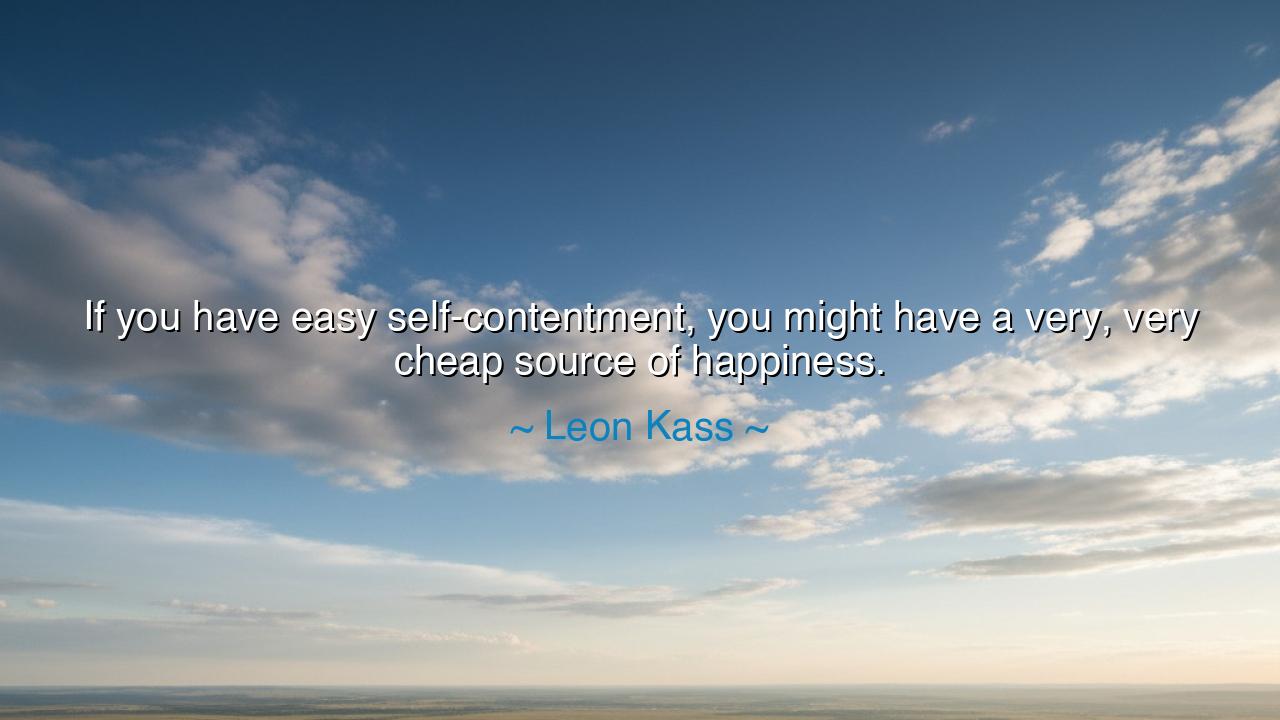
If you have easy self-contentment, you might have a very, very
If you have easy self-contentment, you might have a very, very cheap source of happiness.






In the thoughtful words of Leon Kass, the philosopher and physician who pondered deeply on human fulfillment, we encounter a warning cloaked in subtle wisdom: “If you have easy self-contentment, you might have a very, very cheap source of happiness.” These words speak to a paradox that has challenged humankind since time immemorial — that the ease of comfort can dull the soul, and that happiness acquired without effort or struggle may lack depth, richness, and lasting value. Kass challenges us to examine the quality of our satisfaction, not merely its presence. True joy, he intimates, is forged through effort, reflection, and engagement, not granted by passivity.
The origin of this thought lies in Kass’s reflections on ethics, medicine, and the human condition. Observing both the material abundance and spiritual poverty of modern life, he recognized that happiness often comes at two levels: the cheap and fleeting, or the profound and hard-won. A person content without reflection or challenge may possess a superficial joy, but it is vulnerable to loss, shallow in experience, and devoid of the wisdom that suffering and effort can provide. Kass’s words call attention to the necessity of striving — of seeking challenges and engaging the full capacities of the mind and heart to find the truer sources of satisfaction.
The meaning of this warning is echoed in the lives of those who have pursued ease over excellence. Consider the soldiers of the Roman legions, who in times of peace might have grown complacent, content with feasting and trivial diversions. True honor, however, was earned on the battlefield, through endurance, courage, and sacrifice. The fleeting comforts of easy contentment could never compare to the profound joy and respect that arose from tested virtue. In this, Kass reminds us that happiness is not merely a state of mind, but a reward that grows from effort, challenge, and perseverance.
Even in more ordinary life, the principle holds. A farmer who is content to sow little, reap little, and dream little may enjoy a quiet life, but his happiness is fragile and shallow. Compare this to the farmer who labors through long days, endures hardship, and nurtures his land with patience and care. When the harvest comes, the satisfaction is deep, lasting, and imbued with the richness of struggle overcome. Here, we see the truth of Kass’s insight: easy self-contentment produces a happiness that costs little and teaches less, while true fulfillment is earned through engagement with life’s trials.
History and culture are full of those who discovered this lesson. Michelangelo, confined in a world that doubted his talent and endured countless hardships, found profound satisfaction not in easy pleasures, but in the laborious creation of masterpieces like the Sistine Chapel. His happiness was not cheap; it was earned through sweat, patience, and unwavering commitment to his vision. The joy he experienced was deep precisely because it required effort, skill, and persistence. Kass’s words caution us to seek this type of richness, rather than be seduced by instant gratification or passive comfort.
The philosopher’s insight also serves as a critique of modern life, where conveniences and material abundance can lull the spirit into complacency. The temptation to settle for easy contentment — a life without challenge, reflection, or moral effort — is strong, yet the happiness it provides is fleeting. Kass reminds us that effort and engagement are not burdens, but gateways to profound fulfillment. Without them, life may appear pleasant, but the soul remains undernourished, the mind untested, and the heart only lightly stirred.
Therefore, the lesson is clear: cultivate a life of challenge, reflection, and purpose. Seek to grow, to struggle, and to strive — for it is through these acts that happiness becomes rich, meaningful, and enduring. Do not settle for contentment that comes cheaply or easily, for such joy is shallow and impermanent. Engage fully in work, love, learning, and moral effort. In doing so, you cultivate a happiness that deepens with experience and withstands the trials of life, becoming a true treasure of the soul.
So, my child, let Leon Kass’s wisdom guide your path: do not fear difficulty, discomfort, or the effort required to pursue your dreams. True joy lies not in ease, but in the courage to challenge yourself, to endure, and to grow. Let your contentment be earned, not granted; let your happiness be deep, not cheap. For in this pursuit, the soul finds its richest reward, and the heart learns the true measure of life’s beauty.






AAdministratorAdministrator
Welcome, honored guests. Please leave a comment, we will respond soon